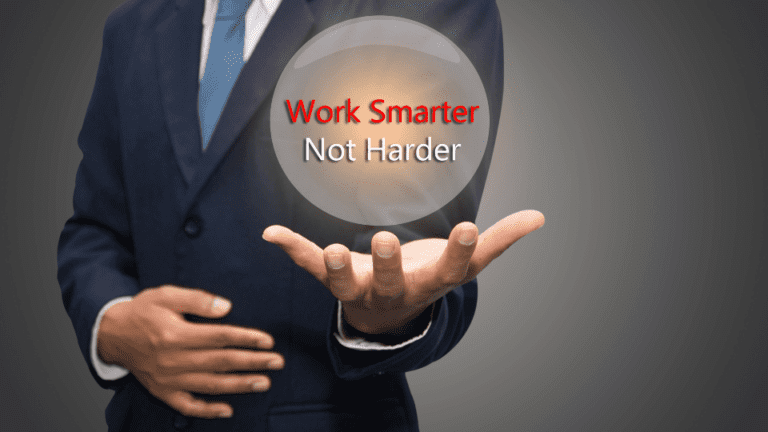
Work Smarter, Not Harder: The Art of Achieving More with Less

In a world where hustling and working tirelessly are often celebrated, the phrase “work smarter, not harder” has gained considerable prominence. It’s a simple yet profound concept that suggests you can achieve more by optimizing your efforts rather than simply grinding away endlessly. In this article, we’ll explore the meaning of this phrase, uncover the essence of working smarter, and share practical strategies for applying this principle to your life.
Understanding the Essence
The keyword “work smarter, not harder” encapsulates a timeless wisdom that goes beyond just being a catchy phrase. It urges us to reevaluate our approach to work and productivity. Rather than working long hours without a clear strategy, it suggests that you can accomplish your goals more efficiently by making intentional choices about how you invest your time and effort.
The Story of Joe: A Case Study
Let’s delve into the concept by introducing you to Joe, a talented young professional. Joe had always been a hard worker. He prided himself on being the first one at the office and the last one to leave. He constantly felt the need to prove himself, often taking on more tasks than he could handle. It was a classic example of working hard, but was he truly working smart?
One day, Joe had an epiphany. He realized that his relentless work ethic wasn’t translating into significant career advancement or personal satisfaction. He was constantly stressed, had little time for his family, and couldn’t remember the last time he truly enjoyed his work. That’s when he decided to embrace the philosophy of “work smarter, not harder.”
Joe started by reevaluating his priorities. He identified the key tasks that truly mattered and aligned with his goals. He realized that he could delegate some of the routine work to colleagues, freeing up his time to focus on strategic projects. By doing this, he reduced his workload and stress levels.
This shift in mindset and approach began to yield remarkable results. Joe not only became more productive but also felt more content with his work-life balance. He finally had the time to learn new skills, invest in self-improvement, and engage in creative problem-solving.
Key Strategies for Working Smarter
So, how can you, like Joe, make the shift from working harder to working smarter? Here are some key strategies to consider:
1. Prioritize Tasks: Start by identifying the tasks that have the most significant impact on your goals. These are your “high-impact” tasks. Focus on them, and allocate your time and energy accordingly.
2. Delegate and Collaborate: Don’t hesitate to delegate tasks that can be handled by others. Collaboration is a powerful tool that can help you achieve more with less effort. Remember, teamwork makes the dream work.
3. Time Management: Mastering time management is essential. Tools like the Pomodoro Technique can help you stay focused and maintain a healthy work-life balance.
4. Continuous Learning: Invest in yourself through learning and skill development. This can make your work more efficient and satisfying.
5. Embrace Technology: Automation and technology can be your best friends. They can handle repetitive tasks, leaving you more time to focus on creative and strategic aspects of your work.
6. Say No: Learning to say no is a valuable skill. Don’t overcommit or take on tasks that don’t align with your goals.
7. Work-Life Balance: Recognize the importance of a balanced life. Overworking can lead to burnout, affecting your productivity and well-being. Make time for relaxation and personal activities.
FAQs
Q1: What’s the origin of the phrase “work smarter, not harder”?
The phrase “work smarter, not harder” is often attributed to Allan F. Mogensen, an industrial engineer. He used it in the 1930s to promote efficiency in the workplace. However, the concept behind the phrase has been around for centuries in various forms, advocating the optimization of efforts.
Q2: Is working smarter always better than working harder?
Not necessarily. The key is finding the right balance. Working hard is essential, but it should be combined with working smart. Pure hard work without direction and efficiency may lead to burnout and wasted efforts.
Q3: How can I determine which tasks to prioritize?
Prioritization involves assessing the impact and urgency of tasks. High-impact, high-urgency tasks should be at the top of your list. Tools like the Eisenhower Matrix can help you categorize tasks effectively.
Q4: Can anyone learn to work smarter, or is it an innate skill?
Working smarter is a skill that can be learned and developed. It’s all about adopting the right mindset, implementing proven strategies, and consistently refining your approach.
Q5: Are there specific industries or professions where working smarter is more critical than working harder?
Working smarter is beneficial in virtually all industries and professions. It’s about optimizing your approach to be more effective and efficient. However, industries with high demands on time and resources, such as healthcare and entrepreneurship, often benefit greatly from working smarter.
Real-Life Success Stories
- Elon Musk: The visionary behind SpaceX and Tesla is a prime example of working smarter. Musk leverages his ability to think long-term and make bold decisions, which have propelled his companies to new heights.
- Warren Buffett: The legendary investor is known for his disciplined approach to investing. He emphasizes the importance of patience and strategic thinking over frenzied trading. His long-term perspective is a testament to working smarter in the world of finance.
- Tim Ferriss: The author of “The 4-Hour Workweek” has become an icon of working smarter. Ferriss promotes the idea of outsourcing, automating, and delegating tasks to achieve more in less time.
FAQs (Continued)
Q6: Are there any specific books or resources that can help me work smarter?
Certainly! Some recommended books include “The 4-Hour Workweek” by Tim Ferriss, “Getting Things Done” by David Allen, and “Deep Work” by Cal Newport. These books offer valuable insights and practical strategies.
Q7: Can working smarter lead to increased job satisfaction?
Yes, it can. When you work smarter, you can achieve better results with less stress. This often leads to increased job satisfaction and a healthier work-life balance.
Q8: What role does creativity play in working smarter?
Creativity is a significant factor in working smarter. It allows you to find innovative solutions to problems and think outside the box. Creative thinking can lead to more efficient processes and better results.
*Q9: How can I stay motivated when transitioning to a “work smarter” approach?
Staying motivated requires setting clear goals, celebrating your achievements, and staying committed to continuous improvement. Surrounding yourself with supportive peers can also help maintain motivation.
*Q10: Can “work smarter, not harder” be applied to personal life as well?
Absolutely. The principles of working smarter can be applied to personal life, such as time management, setting priorities, and achieving a balanced and fulfilling life.
Incorporating the Philosophy
Applying the “work smarter, not harder” philosophy is not just about professional success; it can also lead to a more fulfilling and balanced life. Let’s take a look at how it can be incorporated into various aspects of your daily routine:
1. Time Management for Students
For students, mastering the art of working smarter, not harder, can be a game-changer. Imagine a college student named Sarah, who used to spend long hours studying but often struggled with retaining information. She decided to implement this philosophy in her academic life.
Sarah began by breaking her study sessions into shorter, focused blocks using the Pomodoro Technique. This allowed her to maintain high concentration levels while still having time for short breaks. She also created a weekly study schedule, allocating more time to challenging subjects. By prioritizing her tasks, she found that she could retain information more effectively, resulting in better grades.
2. Work Smarter at Home
The principles of working smarter can also be applied at home. Take the example of John, a father of two, who used to feel overwhelmed by household chores and family responsibilities. By adopting some key strategies, he transformed his home life.
John started by creating a family calendar that organized everyone’s schedules. This reduced the chaos of last-minute plans and ensured everyone’s needs were met. He also automated bill payments, saving time and avoiding late fees. The “work smarter, not harder” mindset helped him achieve a more organized and harmonious family life.
3. Entrepreneurs and Small Business Owners
Entrepreneurs and small business owners can greatly benefit from working smarter. Let’s consider the story of Emily, who runs a successful online store. Initially, she tried to handle every aspect of her business, from inventory management to customer service. It was exhausting, and she was on the verge of burnout.
Emily decided to delegate certain tasks, such as order fulfillment and customer inquiries, to a virtual assistant. This allowed her to focus on business development, marketing, and product design. Her business flourished as a result, and she was able to enjoy the fruits of her labor without the burden of micromanagement.
FAQs (Continued)
Q11: Can working smarter improve work efficiency in a team or organization?
Absolutely. The “work smarter, not harder” philosophy can enhance team productivity by encouraging efficient processes and clear communication. In organizations, it often leads to better results and job satisfaction.
Q12: What’s the role of goal-setting in working smarter?
Setting clear and achievable goals is pivotal. It provides direction and motivation, helping you prioritize tasks and work towards your objectives in a focused and efficient manner.
Q13: Is it possible to over-optimize and neglect the importance of hard work?
Yes, over-optimization can be a pitfall. The key is to strike a balance. Hard work is essential, but it should be complemented by intelligent choices and efficiency.
Q14: Can working smarter also save money?
Working smarter often leads to cost savings. By automating tasks, reducing errors, and optimizing processes, you can minimize unnecessary expenses and improve your financial situation.
*Q15: How do I measure the success of working smarter?
Success can be measured in various ways, depending on your goals. It could be increased productivity, better time management, improved work-life balance, or achieving personal and professional milestones.
Maximizing Your Potential
The “work smarter, not harder” approach empowers you to maximize your potential, whether in your career or personal life. It’s about making conscious choices that allow you to achieve more with less effort. Just like Joe, Sarah, John, and Emily, you can harness the power of this philosophy to unlock your full potential.
As you embark on your journey towards working smarter, remember to adapt the principles to your unique circumstances. What works for one person may not work for another, and that’s perfectly okay. The key is to remain flexible, open to change, and committed to continuous improvement.
Whether you’re a student looking to boost your academic performance, a parent striving for a balanced family life, an entrepreneur aiming for business growth, or anyone seeking a more fulfilling and efficient life, the philosophy of “work smarter, not harder” can be your guiding light.
Conclusion
In a world that often glorifies overwork and busyness, the wisdom behind “work smarter, not harder” stands as a beacon of hope. It encourages us to step back, reassess our priorities, and make deliberate choices about how we invest our time and energy.
By focusing on high-impact tasks, embracing technology, and prioritizing a balanced life, you can experience the transformative power of working smarter. The stories of Joe, Sarah, John, and Emily serve as vivid reminders that this philosophy is not just a catchphrase; it’s a blueprint for success and fulfillment.
Incorporate the strategies we’ve discussed, and make this philosophy your own. Whether you’re a student, a parent, an entrepreneur, or someone in search of a more efficient and meaningful life, working smarter can be the key to unlocking your full potential and achieving more with less. It’s not about working less; it’s about working better. So, dare to dream, plan strategically, and execute efficiently – work smarter, not harder, and watch your life flourish.